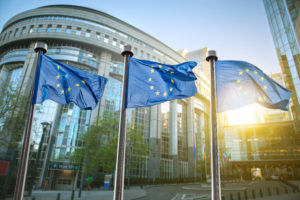Highlights from Last Week
CW 24 / Monday, 13 to Thursday, 16 June: Committee meeting week (Brussels);
DIGITAL SERVICES ACT I – COUNCIL AND PARLIAMENT GIVE GREEN LIGHT: Last week, the Committee of Permanent Representatives to the EU (Coreper) and the Internal Market Committee in the European Parliament (IMCO) confirmed the compromise on the DSA (PDF), clearing the way for final support in the Council (in September at the latest) and in the plenary of the EU Parliament (probably on 4 July).
Previously, France had, among other things, withdrawn the amendments to Recital 28 concerning ”stay down” rules ( see EP press release).
DIGITAL SERVICES ACT II – BRETON WANTS RESPONSIBILITY OF MEDIA AUTHORITIES: “In several states, and this seems like common sense to me, the media authority will act as the national coordinator of the DSA authorities. Many come to us to prepare for that. We guide them in this reflection [on the choice of coordinator], we don’t prescribe it, but it is the tendency we are moving towards”, the EU Internal Market Commissioner told Parliament’s Culture Committee on Wednesday, 15 June (video).
This ”common sense” approach has been the Commission’s line since the DSA was presented, even if the executive leaves the choice to the individual states. The overlap between the two groups, Erga on the one hand and the DSA Coordinating Committee on the other, is still unclear (see Contexte, paywall, FR).
CSAM REGULATION – GERMANY HAS 61 QUESTIONS FOR THE COMMISSION: The German federal government has sent a long list of questions to the EU Commission on the planned legislation concerning child sexual abuse content on the Internet. The project has come under massive criticism because of the threat of mass surveillance.
In the document, the German federal government emphasises that it welcomes the project as an important step in the fight against child sexual abuse but is examining it against the background of its coalition agreement. It is the first written statement of the German federal government on chat control that is known (see netzpolitik.org, DE).
ARTIFICIAL INTELLIGENCE I – ITRE AND CULT RESOLVE OPINIONS: The ITRE Committee last week adopted its draft opinion on the AI law, which is supported by all major political groups. The definition of AI systems was aligned with that of the OECD, which is in line with the EPP’s approach to make the AI law a global standard. At the same time, the more progressive MEPs pushed for the deletion of the relevant annex. The text retains the previous definition of high-risk AI systems, but delivers more realistic requirements for developers in areas such as accuracy, robustness, cybersecurity and data. It also puts the Commission in charge of overseeing the creation of regulatory sandboxes, including a new annex that provides more detail on what these tools should do – an approach that contrasts with the one proposed by France. To support SMEs and start-ups, the opinions call for more involvement of these companies in the standardisation process and urge the Commission to look for ways to reduce compliance fees. The report also includes a “research exemption”, meaning that the regulation would not apply to AI systems developed for research purposes.
The CULT Committee also adopted its opinion on the AI law. MEPs agreed on an updated list of high-risk applications in education. The updated list in the report includes e-proctoring systems used to monitor and detect improper behaviour of students during exams. The classification rules for high-risk AI systems are the only shared responsibility of the CULT Committee.
ARTIFICIAL INTELLIGENCE II – FRANCE PROMOTES MORE FLEXIBILITY FOR REGULATORY SAND BOXES: The EU Council’s Telecoms Working Group on Friday considered a consolidated version of France’s compromise proposals on the AI file. The document (PDF, FR) contains new proposals on measures to promote innovation. The Council Presidency “significantly shortened” the article on regulatory sandboxes ”in order to provide more flexibility for Member States to put in place” such arrangements, according to its statement. It deleted from its proposal the provisions on free access to sandboxes and the maximum duration of participation, as well as some obligations related to “specific plans”. Instead, the text includes two new articles.
The first allows providers of AI systems to obtain “written evidence of the activities successfully carried out in the sandbox”. The second allows tests under real conditions. The articles on collecting personal data and testing high-risk systems in real conditions have also been amended. The Presidency has revised the articles on administrative penalties and proposes to relax them even further for SMEs (see Contexte, paywall, FR; Euractiv).
PRODUCT SAFETY – IMCO ADOPTS REPORT: The Internal Market Committee (IMCO) on Thursday adopted MEP D.Charanzova’s (Renew) report (PDF) on the General Product Safety Regulation (APVO) by 41 votes to one. This regulation complements the Digital Services Act. The distribution of measures between the two texts led to an extended debate between Charanzova and the DSA rapporteur, C. Schaldemose (S&D). In the end, most of the measures concerning the products themselves were reserved for the Product Safety Regulation.
Specifically, the Parliament wants to oblige marketplaces to remove dangerous products within one day after an authority has received a notification about a dangerous product. MEPs also call on companies to carry out random checks on products offered for sale by third-party providers (see EP press release).
The Council still has to adopt its general approach to open the trilogue talks.
DATA ACT – RESPONSIBILITY CONTINUED: The Industry Committee (ITRE) agreed with the Civil Liberties Committee (LIBE) on the competencies regarding the Data Act, giving the LIBE Committee exclusive competence for all aspects of privacy and data protection. Green MEP S. Lagodinsky is to act as rapporteur for the LIBE opinion. However, the split has already been questioned by the Legal Affairs Committee (JURI), which, led by S&D coordinator Ibán Garcia del Blanco, is pushing to keep part of the GDPR-related provisions, alongside the IPR parts. The picture is further complicated by IMCO’s request to receive the interoperability provisions.
The Conference of Committee Chairs is expected to deliver an opinion on the allocation by the middle of this week, which will land on the table of the Conference of Presidents on 30 June. Whether an agreement can be reached before the summer break seems doubtful (see Euractiv).
COUNCIL PRESIDENCY – CZECH REPUBLIC PRESENTS PRIORITIES: After France, the Czech Republic will take over the Presidency of the Council of the European Union on 1 July. Even though the three presidencies (with Sweden) had previously drawn up a joint trio programme (PDF), current events have once again led to changes. The five priorities revolve around security and defence in a broader sense.
DISINFORMATION – UPDATED CODE OF CONDUCT PRESENTED: Last week, the long-awaited revised Code of Conduct on Disinformation was published. The Code now has 33 signatories, 44 commitments and 128 actions that can be signed.
The Code’s commitments address the issue of monetisation through disinformation, political advertising, manipulative techniques, transparency and the empowerment of citizens, researchers and fact-checkers. However, the Code provides for a permanent working group to monitor its implementation, which will lead to broader participation. In addition, platforms must take measures to ensure safe design and algorithmic accountability, and report on these by language or Member State.
Companies have six months to implement the measures. The first report on implementation is to follow in 2023. V. Jourová and T. Breton also referred to the European law on media freedom, which is to be published this year and will also address the algorithmic distribution of content (see COM press release; Euractiv).
NIS2 – CONCLUSION MOVES NEAR: A four-column document on NIS2 (PDF) dated 3 June was up for discussion in the EU Council last week. Most of the work took place in the recitals, which were better aligned with other legislation such as DORA, GDPR and eIDAS. The main change is that Member States can introduce mechanisms to finance the additional tasks that public sector bodies will have to perform to put the NIS2 Directive into practice. The provisions on the notification procedure that countries must carry out in order for bodies to raise the alarm in the event of “significant” incidents have also been clarified, and a recital has been included stating that the business operations of organisations must not be unduly disrupted when carrying out supervisory measures. The text was agreed at the last technical meeting on Thursday and is expected to be adopted in Coreper on 22 June. However, MEPs are reluctant to see it adopted in ITRE as they first want to see the text that emerges from DORA and the Critical Facilities Resilience Directive, meaning that the plenary vote is likely to be delayed until after the summer (see Euractiv).
E-EVIDENCE REGULATION – A LITTLE PROGRESS: France still has until the end of June to reach the goal of a political agreement on the E-Evidence Regulation. According to media reports, agreement was reached last week on one of the central points of the debates.
On the one hand, the Parliament agrees to the idea of including the criterion of residence in the notification procedure. It would thus be possible, if the target resides in the state issuing the order, for the state where the service holding the evidence is based not to be able to raise an objection.
For its part, the French Presidency of the Council understood, according to parliamentary sources, that the Parliament would demand a uniform reporting system for content and traffic data until the end. The text should state that if a state issuing an order is subject to an enquiry regarding the rule of law (Art. 7), the authority setting up the service must take this into account when accepting or rejecting the order.
Several shadow rapporteurs are reportedly urging the rapporteur to take advantage of the French “momentum” and their will to close the dossier under this presidency. The Commission hopes to organise a final political trilogue by the end of June. Two technical meetings are currently planned for the next few days. (see Contexte, paywall, FR)
EU-US PRIVACY SHIELD – NO LONGER 2022: The European Union and the United States could conclude a new agreement on transatlantic data transfers in the first quarter of 2023, EU Justice Commissioner Reynders said last week.
Once the EU has the text for the implementing regulation, the Commission will have to take into account the views of national data protection authorities, EU countries and EU legislators to reach a final legal agreement in a process that will take about six months, Reynders said. “I would say it’s more likely for the end of the first quarter of next year than before,” Reynders said, referring to a new data transfer pact (see Table Europe, paywall).
MEDIA FREEDOM ACT – NEGATIVE OPINION OF REGULATORY CONTROL COMMITTEE: As reported by Contexte (Paywall, FR), the Regulatory Scrutiny Board issued a negative opinion on 10 June on the first impact assessment of the Media Freedom Act. In the eyes of the Board, which has the task of verifying the validity of the Commission’s legal arguments to justify its approach, the impact assessment does not sufficiently justify the single market logic. Nor does it sufficiently explain why the measures planned for this harmonisation make sense.
The second version of the impact assessment is expected to be published in July. A postponement of the Commission proposal expected for September is currently not to be expected.
MINIMUM TAX – HUNGARY VETOES AGREEMENT: At the meeting of EU finance ministers on 17 June, Hungary vetoed the draft directive to introduce a 15% tax on large multinational corporations. The reason given was the war in Ukraine and the general economic situation, which did not lend themselves to higher taxation of companies.
“This in no way affects the determination of the French Presidency” to reach an agreement, said French Minister B. Le Maire. Unless something changes at the last minute, no further meeting in the so-called Ecofin format is planned until 30 June. The dossier keeps running into vetoes: before Hungary, it was Poland that foiled the previous attempts. Finally, the country gave up its resistance. And on the same day it received the green light from the Member States for its share of the European economic stimulus package (see Der Standard, DE, Reuters, EN).
AUSTRIA – ECJ SHOULD JUDGE COMMUNICATION PLATFORM LAW: Austria’s Administrative Court (VwGH) on Friday referred the country’s equivalent to Germany’s Network Enforcement Act to the ECJ: The Austrian judges want to know from the ECJ whether the Viennese lawmakers violated European law with their Communications Platforms Act. Among other things, they are asking the Luxembourg judges whether national legislators are allowed to enact such specific regulations at all within the framework of the e-Commerce Directive, which is now being revised with the DSA. The European subsidiaries of Google, Twitter and the Facebook parent Meta had filed a complaint against the Austrian law ( see press release VwGH, DE).
UK – LESS COOKIE POP-UPS: As part of the redesign of its data framework, the UK government published its responses to its public consultation last week. The government has three objectives: “harnessing the power of data to help UK businesses trade overseas, strengthening the UK’s position as a scientific and technological superpower, and improving people’s daily lives”.
In relation to cookies, the government is promoting “opt-out” and settings that allow consent to be waived on a case-by-case basis, for example via the browser. Several provisions aim to “cut unnecessary red tape” to save businesses “around £1 billion”. In addition, the Information Commissioner’s Office (ICO), the UK regulator, is to be “modernised”. Some fear that it could lose independence as a result (see The Register). Finally, the plan is to give researchers “more flexibility to conduct vital scientific research and make important breakthroughs”.
Relevant Publications, including from the EP Think Tank:
- Artificial intelligence act and regulatory sandboxes (Briefing)
- The NIS2 Directive: A high common level of cybersecurity in the EU (Briefing)
- Empowering consumers for the green transition (Briefing)
- Path to the digital decade programme (Briefing)
- Fit for 55 package: Reducing methane emissions in the energy sector (Briefing)
- Main results – Economic and Financial Affairs Council, 17 June 2022
Outlook for the Current Week
You can find a list of the upcoming dates of the European Parliament here. The meeting calendar for 2022 can be found here (PDF). The overview of the agenda for the upcoming mini plenary sessions week can be found here.
An overview of the most important dates of the Council week can be found here and the meeting calendar can be accessed here.
Included among these dates are:
Summits and Ministerial Meetings:
- Foreign Affairs Council, Monday, 20 June – Agenda, A Items, Background Brief;
- General Affairs Council, Tuesday, 21 June – Agenda, A Items;
- European Council, Thursday, 23 and Friday, 24 June – Agenda;
Preparatory Bodies:
- Working Party on Telecommunications and Information Society, Monday, 20 June;
- Working Party on Competition, Monday, 20 June and Wednesday, 22 June;
- Working Party on Competitiveness and Growth (Industry), Monday, 20 June;
- Horizontal Working Party on Cyber Issues, Tuesday, 21 June;
- Working Party on Intellectual Property, Tuesday, 21 June and Wednesday, 22 June;
- Working Party on Consumer Protection and Information, Tuesday, 22 June;
- Coreper I (including NIS2), Wednesday, 22 June and Friday, 24 June;
- Coreper II, Monday, 20 June and Wednesday, 22 June;
Information on the weekly Commission meeting can be found in the preview (PDF) or (at short notice) in the current agenda.
The following topics are on the agenda for next week:
- Review of trade and sustainable development
You can find the judicial calendar of the ECJ here.
European Parliament Committees
CW 25 / Monday, 20 to Thursday, 23 June: Mini Plenary Sessions Week (Brussels)
LIBE Committee (EP)
Current Meetings
- None
Further Meetings (Calendar)
- Monday, 27 June 2022, 14.30-18.30 (Brussels)
JURI Committee (EP)
Current Meetings
- None
Further Meetings (Calendar)
- Thursday, 30 June 2022 (Brussels)
- Wednesday, 13 July 2022 (Brussels)
- Thursday, 14 July 2022 (Brussels)
Dossiers Timetable (13 June 2022)
ITRE Committee (EP)
Current Meetings
- None
Further Meetings (Calendar)
- Monday, 27 June 2022, 15.00-18.30 (Brussels)
Dossiers Timetable (15 June 2022)
IMCO Committee (EP)
Current Meetings
- None
Further Meetings (Calendar)
- Monday, 11 July 2022 (Brussels)
- Tuesday, 12 July 2022 (Brussels)
Dossiers Timetable (May 2022)
CULT Committee (EP)
Current Meetings
- None
Further Meetings (Calendar)
- Wednesday, 13 July 2022 (Brussels)
Further Scheduled Parliamentary Calendar Dates
CW 26 / Monday, 27 to Thursday, 30 June: Political Group and Committee Meetings Week (Brussels);
CW 27 / Monday, 4 to Thursday, 7 July: Plenary Sessions Week (Strasbourg);
CW 28 / Monday, 11 to Thursday, 14 July: Committee Meetings Week (Brussels);




